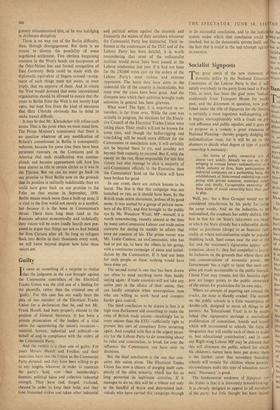Guilty
IT came as something of a surprise to realise that the judgment in the case brought against the Communist controllers ,,of the Electrical Trades Union was the civil one of a finding for the plaintiffs, rather than the criminal one of 'guilty.' For this case has not really been the plea of one member of the Electrical Trades Union for a declaration that he, and not Mr. Frank Haxell, had been properly elected to the position of General Secretary. It has been a private prosecution of the leaders of a vital union for squandering the union's resources— material, human, industrial and political—on behalf of and in compliance with the orders of the Communist Party.
And the verdict is a clear one of guilty. For years Messrs. Haxell and Foulkes and their associates have run the Union as the Communist Party dictated; and they have been willing to go to any lengths whatever in order to maintain the party's hold over their membership's finances, political value and collective industrial strength. They have lied, forged, traduced, cheated In order to keep their hold; and they have fomented strikes and taken other industrial and political action against the interests and frequently the wishes of their members whenever the Communist Party has instructed. Their in- fluence at the conferences of the TUC and of the Labour Party has been baleful; it is worth remembering that most of the unilateralist motions would never have been passed at the Labour conference last year if it had not been for the 250,000 votes cast on the orders of the Labour Party's most vicious and extreme opponents. The harm they have done to the industrial life of the country is incalculable, but must over the years have been great. And the disrepute into which their activities brought trade unionism in general has been grievous.
What now? The fight, it is important to re- member, is far from over. While the case was actually in progress, the elections for the Execu- tive Council of the Electrical Trades Union were taking place. Their results will not be known for some time, and though the ballot-rigging and vote-faking will be much more difficult for the Communists to manipulate now, it will certainly not be beyond them to try, and possibly not beyond their capacity to succeed. But if, with the enemy on the run, those responsible for this first victory can also manage to elect a majority of anti-Communist officials to the Executive, then the Communists' hold on the Union will have been broken for good.
In any event, there are certain lessons to be learnt. The first is that this campaign was not launched or run, as it should have been, by the British trade union movement, jealous of its good name. It was started by a group of private mem- bers of the ETU, and first brought to the public eye by Mr. Woodrow Wyatt, MP—himself, it is worth remembering, roundly abused at the time by many anti-Communist Labour and trade union stalwarts for daring to meddle in affairs that were no concern of his. The prime mover was Mr. Leslie Cannon, an ex-Communist, who has had to put up, as have the others in his group, with a continuous campaign of abuse and intimi- dation by the Communists. If it had not been for such people as these, nothing would have been done yet.
The second moral is one that has been drawn too often to need anything more than baldly stating again: if trade unionists will not take any active part in the affairs of their union, they can hardly complain when unscrupulous men who are willing to work hard and conspire harder gain control.
The third conclusion to be drawn is that it is high time Parliament did something to make the rules of. British trade unions—shockingly lax in more unions than the ETU—sufficiently tight to prevent this sort of conspiracy from occurring again. And coupled with that is the urgent neces- sity for the Labour Party to do something about its rules and constitution, to break for ever the influence the Communists can have over its decisions.
But the final conclusion is the one that con- cerns this union alone. The Electrical Trades Union has now a chance of purging itself com- pletely' of the alien minority which has for so long perverted its legitimate activities. If it manages to do so, this will be a tribute not only to the handful of brave and determined indi- viduals who have carried this campaign through to its successful conclusion, and to the judicil system under which that conclusion could t reached, but to the democratic system itself, an the fact that it could in the end triumph again its enemies.


































 Previous page
Previous page